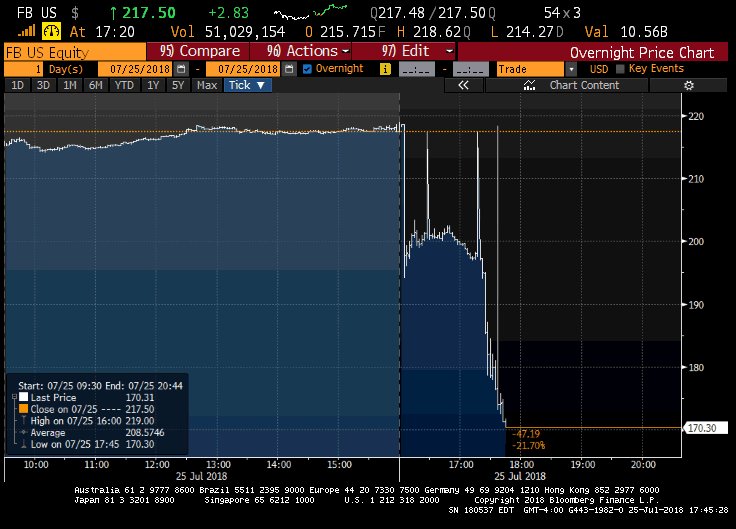“The core Facebook platform is declining,” said Brian Wieser, an analyst at Pivotal Research Group.
Revenue, fueled by mobile advertising sales, increased 42 percent to $13.2 billion in the quarter, Facebook said Wednesday in a statement. Analysts projected $۱۳.۳ billion. The quarter marked the first time Facebook had missed analysts’ revenue projections since 2015.
“We expect our revenue growth rates to decline by high single-digit percentages from prior quarters sequentially in both Q3 and Q4,” Wehner said on the call. Facebook sales increased 47 percent, year over year, in both the third and fourth quarters, of 2017.
Facebook said it had 1.47 billion daily active users in June, compared with the 1.48 billion average of analysts’ estimates compiled by Bloomberg. The company’s user base was unchanged in its biggest market, the U.S., and Canada, at 185 million daily users, while declining in Europe to 279 million daily users. Overall, average daily users increased 11 percent from the period a year earlier.
Facebook’s shares had earlier closed in New York at $217.50, a record high, and had gained 23 percent this year.
The Menlo Park, the California-based company reported net income of $5.11 billion, or $1.74 a share, compared with analysts’ average estimate of $1.71 a share, according to data compiled by Bloomberg.
The social network, in spite of the drama of the past few months, still holds one of the world’s most valuable sets of data on what people are interested in, and makes that audience easily available to advertisers. But the company’s ad growth engine contended with disruptions in its most lucrative markets. In Europe, Facebook had to respond to new privacy rules. In North America, an effort to get all political advertisers to verify their identities may have halted some purchases as the company worked through its broad definition of what’s considered “political.”
The company remains in a dominant position in mobile advertising alongside Alphabet Inc.’s Google. Facebook said mobile made up 91 percent of ad revenue in the recent period, compared with about 87 percent a year earlier.
As Facebook gets bigger, reaching a majority of the world’s Internet-connected population, it’s becoming more reliant on properties other than the company’s main social network to fuel growth. It owns three other properties with more than 1 billion users: WhatsApp, Messenger, and Instagram. Instagram’s business model is so far the most mature, and likely contributed meaningfully to the company’s revenue in the quarter, analysts have said, though Facebook doesn’t break out sales for the app.
Facebook has said it will increase spending to make investments in video content, and on new bets like artificial intelligence and virtual reality. The company is also rapidly expanding its real estate around the world to accommodate a hiring spree, which includes thousands of new workers to help combat foreign election manipulation on the site. In 2016, Russia ran a campaign on Facebook to cause political unrest in the U.S. around the presidential election. The company said headcount was 30,275 as of June 30 — an increase of 47 percent year over year.
The company has been working to convince users it has their best interest at heart, after reports of Russia’s interference and disclosures that a political consulting firm gained access to private personal information. Zuckerberg in January said he was going to adjust the news feed to make sure people spend more time on Facebook with meaningful content from their friends and family members — a move the company has said would decrease user engagement with the site.
نقل از بلومبرگ


یک نظر